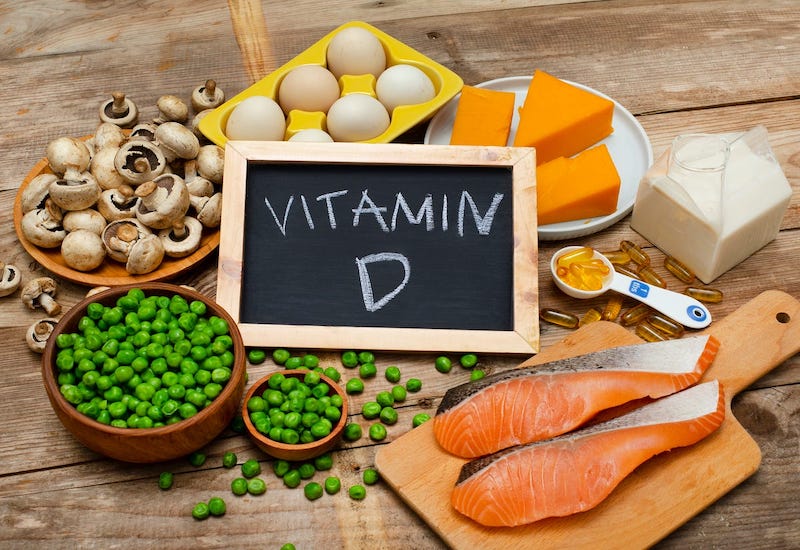Vitamin D is important for overall health, but many people are deficient in vitamin D. This may be because there are few food sources of vitamin D and many people do not get enough sunlight, especially in winter, or live in areas with little sunlight and/or cover their skin too much when outdoors.
The average recommended daily value (DV) of vitamin D for adults is 20 mcg (800 IU - international units).
For reference, each egg and a can of tuna (85g) have over 1 mcg of vitamin D; 85g of salmon provides about 14 mcg. So unless you take a tablespoon of cod liver oil (34 mcg) or eat salmon every day, it's unlikely you'll reach your recommended levels through food alone, since most food sources of vitamin D provide small amounts.
That's why many people supplement with vitamin D. However, it's important to get the right amount your body needs and absorb it properly for maximum effectiveness.

Most food sources of vitamin D provide small amounts.
1. Factors to consider when supplementing vitamin D
- Health conditions: Certain health conditions can affect an individual's vitamin D levels (or needs). These include osteoporosis, depression, kidney or liver disease, and a family history of neurological diseases.
It's especially important for people with absorption issues, such as inflammatory bowel disease or post-gastric bypass surgery, to talk to their doctor to address the issue, recommend dosages, and get personalized guidance on when to take vitamin D, says David Davidson, MD, a cardiologist at Endeavor Health Medical Group in Chicago, Illinois.
Body size can also change your ability to absorb and dose vitamin D, so talk to your doctor for personalized advice before you start taking vitamin D supplements.
- Dietary habits: Because vitamin D is a fat-soluble vitamin, combine taking vitamin D with a meal that includes high-fat foods, such as avocados, nuts, whole-fat dairy, and fatty seafood, to optimize absorption.
- Types of vitamin D: There are two types of vitamin D, D2 and D3. Plants, mushrooms, and UV-enhanced foods provide D2, while we get D3 from sunlight and animal-based foods.
While both are important and beneficial, vitamin D3 has a higher bioavailability than vitamin D2. This means that your body uses vitamin D3 more efficiently, so you may need a higher dose of vitamin D2 to get the same effect as if you took a supplement containing only D3.
Before starting any new supplement regimen, talk to your healthcare professional or nutritionist about the best form of vitamin D for you and which form to take.
2. When to supplement vitamin D?

Talk to your doctor about the best form of vitamin D for you...
- Taking vitamin D in the morning or evening: According to Dr. Davidson, it doesn't matter what time of day you take vitamin D supplements. Many people find it helpful to take them in the morning, but others find it convenient to take them in the evening. It won't make a significant difference in absorption rates, the important thing is how easy it is for you to remember and take them regularly...
- With or without meals: TS. Davidson says the timing of vitamin D supplements isn't important, but it should be taken with food, because it's a fat-soluble vitamin, so food, especially healthy fats, helps with vitamin D absorption.
- Is there a best time?: As with any new medication or supplement, users should consult with their doctor to determine the best time for them. However, as a general rule, the 'best' time is the time that works best for you.
Ideally, you should take your vitamin D supplement with a meal or snack that contains a source of fat. But if you find that strategy difficult or if you notice nausea, constipation, changes in appetite, or other adverse symptoms after taking your supplement at that time of day, talk to your doctor.
Source



































































































Comment (0)